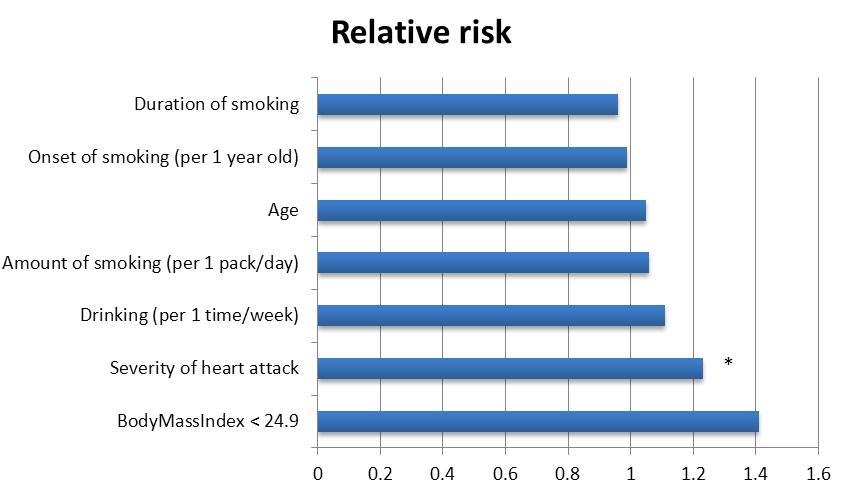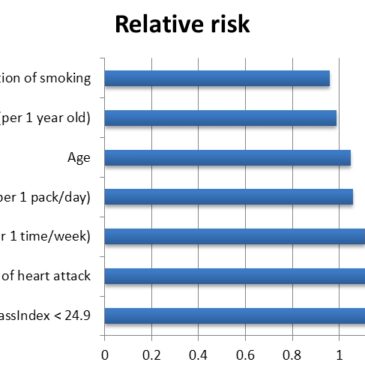Smoking cessation can significantly reduce the mortality risk among smoking patients with coronary artery disease (Critchley & Capewell, 2003). However, many patients fail to quit smoking despite the well-known risk. Today’s ASHES reviews a study that investigates adherence to guidelines to quit smoking among patients after a myocardial infarction (MI) (Choi et al., 2013).
Methods
- The researchers recruited 275 smoking patients (97% males) immediately after or one year after they had been admitted to a hospital due to MI. All patients were instructed to stop smoking by their doctors. The researchers collected data on
- Smoking behavior,
- Severity of coronary artery disease measured as number of blood vessels with severe stenosis (i.e., abnormal narrowing) and other medical, physiological and demographic characteristics not discussed further.
- The researchers conducted a logistic regression analysis to discover the main predictors of successful smoking cessation one year after heart attack. The regression model tested multiple factors to predict successful smoking cessation a year after the heart attack. The potential predictors were smoking pattern (i.e., smoking onset age, amount and duration), BMI, drinking habits, age, and severity of cardiovascular disease.
Results
- Although all patients were specifically instructed to stop smoking, only about half of the patients (53%) actually stopped smoking after the heart attack. An additional 30% decreased their smoking.
- The model revealed that the only statistically significant predictor of successful smoking cessation was the severity of coronary artery disease. For every increase of 1 blood vessel with stenosis, patients were 1.2 times more likely to stop smoking. Figure 1 shows the list of predictors and the relative risks associated with each one.

Figure. Relative importance of predictors of smoking cessation. More positive numbers indicate greater likelihood of smoking cessation. Click image to enlarge. Note: * p < .05
Limitations
- The authors did not examine many potential predictors, such as education, family history, social support and using of nicotine replacement therapy.
- The authors examined these predictor variables only in isolation; it might be possible that particular combinations of variables (e.g., patient age x patient drinking history) are more predictive of smoking cession.
- The authors did not examine whether certain doctors were any more or less likely to have patients stop smoking. It may be that doctors of patients with more severe heart attack were more persuasive and persistent in their attempts to convince the patients to stop smoking.
- Almost all of the participants were males; generalizability of the results to women is unknown.
Conclusions
The results of the study suggest that only half of patients successfully quit smoking after a heart attack. The only statistically significant predictor of successful smoking cessation was severity of coronary artery disease. This may imply that smoking cessation is possible when the sufficient motivation is present, such as when the patient’s perceive health risk as serious enough. This result might suggests that interventions that strongly emphasize the health risks of smoking might be more effective than interventions that emphasize other reasons to quit . However, other combinations of factors, and factors not measured in this study, might explain the association between severity of coronary artery disease and successful smoking cessation, and more studies should be conducted to clarify which factors affect successful smoking cessation.
–Julia Braverman
References
Choi, Y. J., Park, J. S., Kim, U., Lee, S. H., Son, J. W., Shin, D. G., . . . Lee, J. H. (2013). Changes in smoking behavior and adherence to preventive guidelines among smokers after a heart attack. Journal of Geriatric Cardiology, 10, 146 – 150.
Critchley, J. A., & Capewell, S. (2003). Mortality risk reduction associated with smoking cessation in patients with coronary heart disease: A systematic review. JAMA, 290, 86-97.
What do you think? Please use the comment link below to provide feedback on this article.




